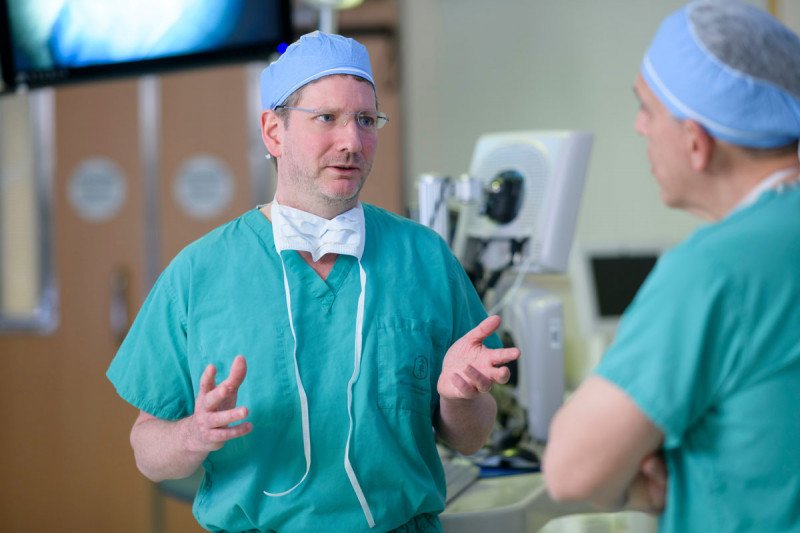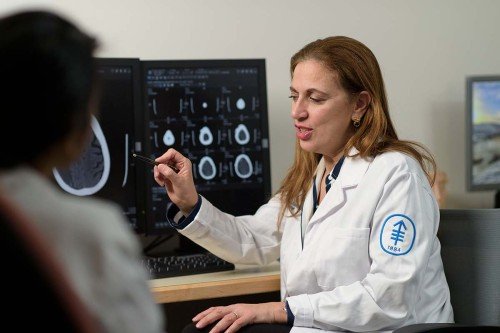
Neurosurgeon Cameron Brennan is an expert in treating people with glioma.
If you or someone you care about has been diagnosed with a glioma, you are facing a lot of difficult decisions. Where should you go for care? What are your treatment options? How can you keep your quality of life?
Reading this guide is a good place to begin finding answers. From this page, you can visit other sections of our glioma cancer guide for more in-depth information.
What is a glioma?
A glioma is a type of tumor that starts in the glial cells. The glial cells surround and support the neurons in the brain and other parts of the nervous system. Gliomas are one of the most common types of primary brain tumors. They can be low grade (slow growing) or high grade (fast growing). Sometimes low-grade gliomas change into high-grade gliomas over time.
What are the different types of gliomas?
There are several types of gliomas. Their names refer to the kind of cells in which they begin:
- Astrocytoma affects the glial cells called astrocytes. The most aggressive astrocytoma is a glioblastoma, which is also called a glioblastoma multiforme.
- Oligodendroglioma affects the glial cells called oligodendrocytes.
- Mixed glioma involves both astrocytes and oligodendrocytes.
- Ependymoma affects cells lining the hollow cavities (ventricles) in the brain and the central canal of the spinal cord.
Each of these types can be broken into grades I through IV according to how slowly or quickly they grow. A glioblastoma multiforme is a grade IV astrocytoma.
The type and grade of glioma you have will determine your treatment options. Early diagnosis and treatment are important in helping you manage this type of tumor.
Learn more about the types of gliomas.
What are the symptoms of a glioma?
The symptoms of a glioma can vary depending on the type of tumor you have and where it is located. These can include headache, seizures, nausea and vomiting, problems speaking or performing everyday tasks, and personality and mood changes.
Learn more about the symptoms of gliomas.
How is a glioma diagnosed?
Our specialists may use several approaches to diagnose a glioma. This can include imaging techniques, such as CT, PET, and MRI scans, and a biopsy. In a biopsy, a doctor removes a small piece of tissue from the tumor. A pathologist (a doctor who specializes in diagnosing disease) will examine the tissue under a microscope to determine whether glioma cells are present.
Learn more about glioma diagnosis.
What are the treatments for a glioma?
Surgery to remove as much of the tumor as possible is usually the first step to treat a low-grade glioma. Some people may benefit from radiation therapy, chemotherapy, or immunotherapy as well. High-grade glioma tumors are challenging to remove completely with surgery. However, new approaches and clinical trials are showing promise at increasing the amount of time after surgery before a high-grade tumor starts to grows back.
Learn more about glioma treatment.
Why should I choose Memorial Sloan Kettering for glioma treatment?
MSK’s team of glioma experts delivers the highest quality of personalized cancer care. Our goal is not only to treat the cancer but also to help you maintain your quality of life. Our specialists work closely with one another to come up with the best possible approach for each person.
At MSK, we offer:
- A multidisciplinary team of experts who are highly experienced in the treatment of gliomas. This includes world-class specialists in neurosurgery, neuro-oncology, neuroradiology, neuropathology, nursing, social work, and more. Members of our glioma team meet regularly to discuss the treatment of the people we care for.
- Advanced surgical technologies used by our doctors to help protect your vision, movement, and other important functions.
- Radiation techniques that target tumors and areas where there is a risk the cancer may come back. This includes delivering radiation guided by highly sophisticated imaging approaches that are not available at most hospitals.
- Carefully tailored chemotherapy treatments designed to be as effective as possible while minimizing side effects.
- State-of-the-art genetic testing to predict which treatments are most likely to shrink or control the specific type of tumor you have. Our Brain Tumor Center is one of only a few centers in the world that has been using this type of personalized, molecular medicine as a routine part of care for people with brain tumors.
- Access to clinical trials investigating new and improved treatments for gliomas. Sometimes these trials offer therapies years before they are available anywhere else.
- A comprehensive program to support the physical, emotional, and spiritual needs of people with a glioma during and after treatment.
- Flexibility in how and where to receive treatment. Our specialists are conveniently located in Manhattan and at our regional outpatient locations in New Jersey, on Long Island, and in Westchester County. This provides our patients with the same outstanding care from MSK doctors closer to home.



